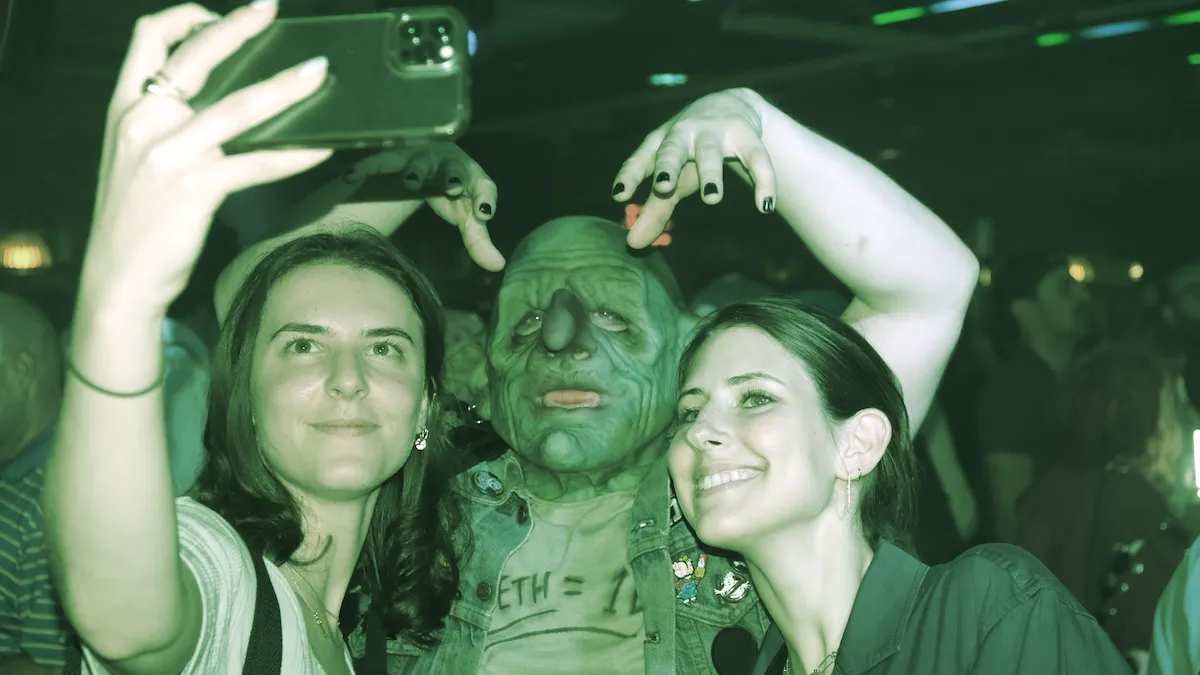Truth Labs, the creator of the Goblintown Ethereum NFT collection that went viral as the NFT market slumped last year, has been accused of "rugging" holders this week by changing all of the project's artwork into animated GIFs of a middle finger holding up three additional middle fingers.
"Fuck royalties. Fuck supporting building and creatives. Flipping is the heart of what makes Web3 special. Honor the flipper, fuck the community. Long live the slow rug," all 10,000 of the animated NFTs now read.
The change comes amid an ongoing stand by Truth Labs in favor of enforcing creator royalties, following recent changes by top marketplaces Blur and OpenSea to only enforce a minimum 0.5% creator royalty fee for many projects. A creator royalty is a fee attached to a secondary market sale of an NFT, and typically ranges between 5% to 10% of the sale price.
Starting today, metadata for all @goblintown, @secretsociety, @The187 and Grumpls has been refreshed.
We are upgrading the contracts for all ERC-721’s in the Truth ecosystem. pic.twitter.com/WJufX5CNTh
— Truth Labs (@truth) April 11, 2023
The sarcastic and facetious tone appears to represent the company's view of a broad shift among some traders that no longer honor full creator royalty amounts when selling NFTs—and perhaps also the marketplaces that enable such behavior.
In addition to the artwork change, Truth Labs announced Thursday that it had disabled any bidding, listing, or trading of Goblintown NFTs on OpenSea and Blur as the company prepares to move its NFTs to new smart contract that fully enforces creator royalty payments on-chain. Smart contracts hold the code that power autonomous decentralized apps (dapps), as well as NFT projects.
Truth Labs said that it will automatically airdrop a new version of each affected NFT—with the original artwork—to holders' wallets by the end of the day on Sunday.
Bidding, listing, buying, and selling on Blur and Opensea have been disabled for @goblintown, @secretsociety, @the187, Grumpls.
The holder snapshot is taking place now and any buys, sells, or transfers that occur from now until the completion of the airdrop are high risk and…
— Truth Labs (@truth) April 13, 2023
"Rugs" are typically described as projects that creators have abandoned or failed to live up to promises with. Truth Labs hasn't done that, but the sudden artwork change and trading limits aren't sitting well with all NFT traders. The company also did the same with its other, less prominent NFT collections, including IlluminatiNFT, The 187, and Grumpls.
Truth Labs did not immediately respond to Decrypt's request for comment.
Why does this matter? Truth Labs wants to preserve creator royalties and continue to receive its chosen percentage of revenue from all secondary sales of its NFTs—a sentiment that many other creators, projects, industry figures, and even NFT marketplaces have echoed in recent months amid disruption in the NFT space.
Starting last summer, new marketplaces undercut the long-standing practice of honoring full creator royalty fees, grabbing away market share by luring away users with less expensive trades. As a result, more established marketplaces eventually followed suit as their once-dominant market share disappeared.
Royalties can be a considerable revenue source for NFT creators, especially on once-trendy collections like Goblintown. The project has seen over $101 million worth of trading volume to date per data from CryptoSlam, although the vast majority of that came in May and June 2022 shortly after the initially free NFT mint.
"We as a team are committed to enforcing a royalty level that makes farming an unprofitable activity. All Truth collections will have 5% royalty going forward," Truth Labs wrote on Tuesday. "Farming" is a reference to Blur's NFT marketplace, which rewards traders for flipping NFTs, but is seen by some in the industry as a form of market manipulation.
Although the royalties debate is contentious among NFT creators and collectors, Truth's move to support royalties hasn't been well received by some members of the NFT community. Some have accused the team of failing to provide "value" to Goblintown owners, as well as engaging in "centralized decision-making."
"Not giving your holders the chance to [make] this decision goes against the ethos of this space," tweeted ArtsDAO co-founder Rahim Mahtab in response to the news. Another Twitter user called the trading halt "unacceptable," adding, "Go back to Web2."
Goblintown started as a blasé, devil-may-care project designed to embrace toilet humor, as well as the degeneracy and debauchery of NFT traders and the subculture that's emerged around it. But today's move has some collectors wondering why its creators expect them to play by their rules.
Editor's note: This article was updated after publication to clarify that negative comments regarding Goblintown's move to enforce royalties were expressed by NFT traders and not necessarily holders of Goblintown NFTs.

